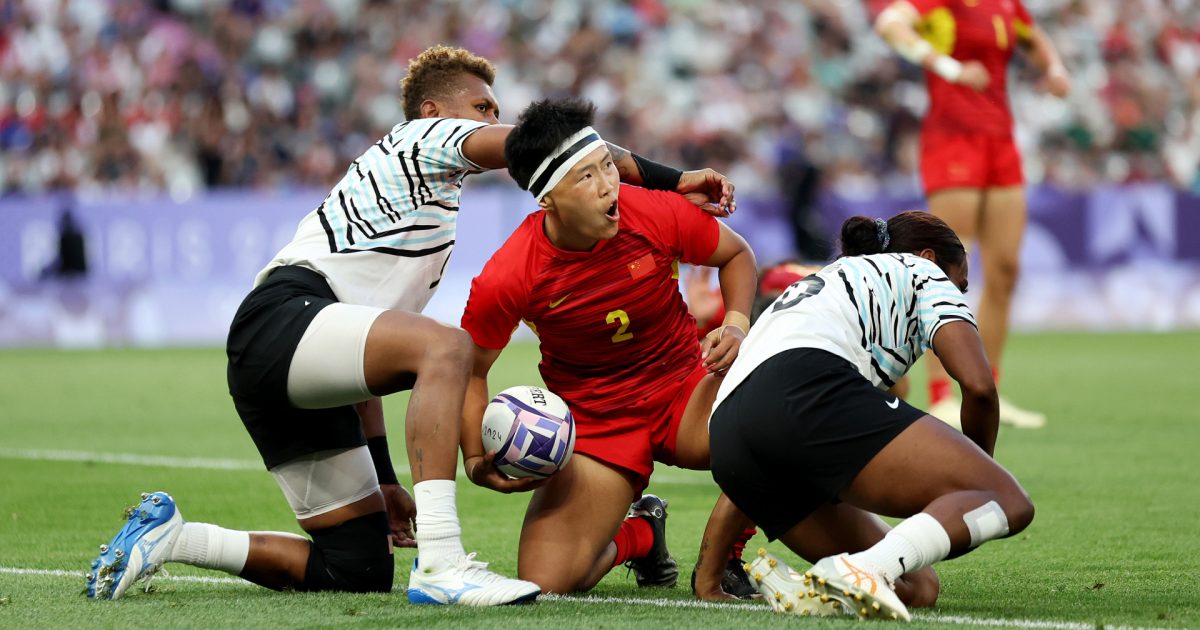China put 40 on Fiji as Tokyo medallists start Paris Games with two losses

Fiji appears likely to miss out on the women’s quarter-finals at the Paris Olympic Games after losing two games on the opening day at Stade de France, which included a shocking 40-12 defeat to newly promoted SVNS Series side China.
The Fijians started their quest for another Olympic medal with a heartbreakingly narrow 17-14 loss to Canada before suffering a devastating defeat later on Sunday. China bounced back from a loss of their own with a masterful display at the Saint-Denis venue.
With a cheer from the crowd, the match got underway. Many would’ve considered Fiji to be overwhelming favourites for this clash but it was the Chinese who got the party started with Wang Wanyu running through a gap to score after just 40 seconds.
China’s No. 6 had restarted play about 10 metres out from the try line with a penalty tap and quickly spotted a gap. Two Fijian defenders moved in opposite directions, almost inviting the try-scorer to run at them – which Wang did, and she was rewarded.
View this post on Instagram
The scoreboard read 5-nil in China’s favour, but that didn’t last long. Fiji hit back almost immediately through Ana Maria who fended off a tackle attempt from Gu Yaoyao to score, with the conversion giving the favourites the lead.
With 12 minutes still to play, many would’ve expected Fiji to run away with it. But China showed on the Challenger Series that they’re a class outfit that boasts plenty of talent and potential, and they proved that to the world once again in this match.
Yang Feifei picked the ball up at a scrum and immediately ran for the blindside. It was too easy really with not a single Fijian defender ready to cover that 15-metre channel in anticipation of that possible play.
But China weren’t done.
Before the end of the half, co-captain Chen Keyi was dragged down a metre or so from the try line. Yan Meiling dove over from the breakdown to add to China’s growing lead, with the conversion giving the underdogs a 19-7 advantage at the half.
There was a sense of déjà vu about what happened next.
China opened the scoring inside the opening minute of that half – just as they had in the first term – with Chen Keyi making a meaningful burst down the right touchline to score. But Fiji hit back right after with a crucial score of their own.
Fiji wouldn’t score any more points in this match, with the Tokyo Games bronze medallists kept to just 12. As for China, they had some more tries in them with Liu Xiaoqian and Dou Xinrong adding one each to complete the famous win.
“That is some upset,” commentator Rikki Swannell exclaimed on the broadcast.
Fiji’s two losses on the opening day means they’ll need to beat New Zealand on day two and count on other results to go their way if they’re at all a chance of moving on as one of the top-two ranked third-placed teams.
China will take on SVNS Series heavyweights Canada. A win for either side will be enough to guarantee them a spot in the quarter-finals along with New Zealand who have already booked their place with two big wins.
































